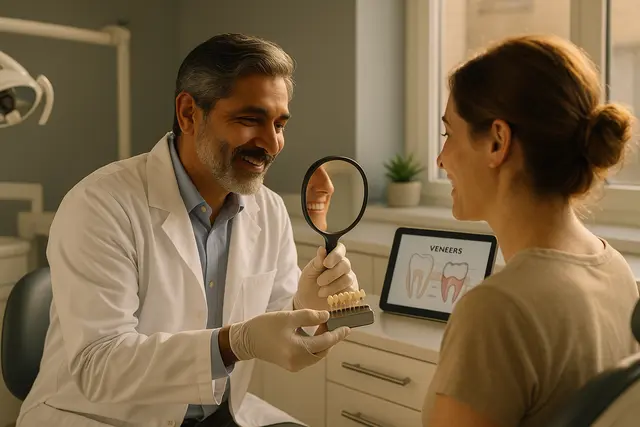Cosmetic Dentistry
5 min read
Jul 29, 2025
How Do Veneers Stay On? The Science Behind a Lasting Smile
A flawless smile isn’t just about luck, it’s often the result of cosmetic dental treatments like veneers. These ultra-thin shells can completely transform the look of your teeth, but have you ever wondered how they actually stay in place for so long? Let’s explore the science that makes veneers not only beautiful but remarkably durable.

You’ve probably seen those perfect smiles, bright, even, totally natural-looking, and wondered: How do they make teeth look that good? Chances are, dental veneers are involved. And while these tiny wonders are a popular cosmetic dentistry treatment, the real mystery is how something so thin can stay firmly stuck to your teeth for years.
Let’s dive into the science (and a little art) behind how veneers stay on and how they hold up to your daily coffee, chewing, and occasional popcorn kernel surprise.
Understanding Veneers and Why They Work
A veneer is a thin shell made from either porcelain or composite, designed to fit over the front surface of your tooth. Think of it like a custom-made cover for your smile, designed to hide imperfections like stains, chips, or gaps between teeth. The magic? Veneers are so precisely crafted and bonded, they can stay put for well over a decade.
Veneers are a popular cosmetic option because they look and feel just like natural teeth. They reflect light in a similar way and can be color-matched to your existing smile. Whether you're dealing with stained teeth, worn edges, or uneven shapes, veneers cover it up beautifully without looking fake.
The Dental Veneer Procedure That Makes It All Possible
So how does the veneer procedure actually work? Your dentist starts by examining your teeth to decide if veneers are the right move. If you're a candidate for dental veneers, they’ll prepare your teeth by slightly reshaping the tooth structure, a step where a bit of enamel needs to be removed to make room for the veneer. This helps the veneer fit snugly and naturally without feeling bulky.
Once the enamel is removed, your dentist will place temporary veneers (so you’re not left with awkward-looking teeth in the meantime). Meanwhile, they’ll take impressions of your teeth and send them to a dental lab. There, technicians create your custom veneers in a dental laboratory to match the shape, size, and color that’s just right for your smile.
How Veneers Are Made to Bond Like a Dream
Let’s talk about how veneers made of porcelain or composite material actually stay in place.
The real MVP here is dental cement. Once your veneers are custom-made, your dentist will clean and etch your tooth to roughen the surface slightly. Then, they’ll apply dental bonding materials and use a special light to harden the cement, which creates a strong, long-lasting hold. This is where the science meets some serious precision. That ultra-tight fit is what allows veneers to last and feel like part of your own teeth.
Porcelain and composite veneers each have their pros and cons:
Porcelain veneers: Are especially durable and stain-resistant, great for longevity
Composite veneers: Are more budget-friendly but may need replacement sooner
Why Veneers Stay on for Years (and Sometimes Decades)
The reason veneers stay securely bonded is all about that detailed prep work and the high-quality dental cement used during the veneer placement. When everything lines up, the fit, the material, the bonding process, veneers are permanent in the best way. They’re designed to stay in place through everyday use: eating, smiling, laughing, and maybe even biting into the occasional crunchy taco.
But don’t get too wild. Biting teeth to open packages or forgetting to protect your veneers if you grind your teeth can weaken the bond over time. That said, most patients find that with good oral habits, their veneers could stay strong and fabulous for 10 to 20 years.
Veneers Applied with Precision Need Proper Care
Once your veneers are applied, keeping them pristine isn’t rocket science, but it does take effort. Regular brushing and flossing, just like with natural teeth, is key.
You’ll also want to maintain good oral hygiene and schedule routine visits with your dentist. Skipping that can lead to gum disease or tooth decay, which even the best veneers can’t fix.
And just a heads-up: even though veneers are thin, they’re strong, not invincible. A hard hit, biting into bones (looking at you, chicken wings), or clenching can cause a chip. If a veneer does fall or may fall due to trauma or decay underneath, it’s usually fixable, but it’s best to avoid that with mindful habits.
Porcelain Veneers vs. Composite Veneers: Which One Is for You?
When deciding between porcelain and composite veneers, consider durability and appearance. Porcelain shells are highly resistant to stains and last longer. They're the preferred option if you're aiming for veneers to last a long time.
Composite or porcelain, either one can look natural, but the difference lies in how much wear and tear they can handle.
Your dentist will walk you through the pros and cons to help you decide. They’ll consider your bite, lifestyle, and the appearance of your teeth. Some people love the instant fix of composite veneers, while others go for the longevity of traditional veneers made of porcelain.
What to Expect After Getting Dental Veneers
After you receive dental veneers, you might feel a bit of sensitivity, especially to hot or cold. That’s totally normal and should fade within a few days. You might also notice your bite feels slightly different while your mouth adjusts. Again, no big deal, your dentist can make minor tweaks if anything feels off.
If everything fits right and you practice good oral hygiene, your dental veneers remain beautifully in place for years. The better you care for them, the longer they’ll look and feel like the real deal.
Veneers Are an Excellent Choice When Done Right
Choosing veneers isn’t just about vanity. For many, it’s about confidence. Whether you're fixing dental issues, covering a chip, or wanting to transform your smile, veneers offer a life-changing (and selfie-changing) solution.
From temporary veneers to your final set, each step is crafted with care and precision.
And while veneers don’t make you invincible, they do make you look fantastic. With proper habits and checkups, veneers are an excellent investment that can totally change the way you feel about your smile.
Keeping Veneers in Good Shape for the Long Haul
If you want to keep your veneers in good condition, the rules are simple:
Don’t chew ice
Don’t use dental tools as nutcrackers
Brush and floss regularly
Avoid teeth grinding and hard impacts
Avoiding issues like can you get cavities under veneers is part of maintaining them long-term.
Regular visits to your dentist, oral hygiene, and avoiding bad habits help your veneers last. So skip the urge to bite into hard candy and treat your smile like the luxury item it is.
How Do Veneers Stay Attached to Your Teeth?
Veneers stay on thanks to a combination of precise enamel preparation and powerful dental bonding cement. The tooth surface is etched slightly to create grip, and a strong adhesive is used to permanently bond the veneer. A special curing light hardens the cement, locking the veneer in place for years.
How Long Do Veneers Typically Last?
With proper care, porcelain veneers can last 10 to 20 years, while composite veneers usually last around 5 to 7 years. Longevity depends on habits, oral hygiene, and avoiding things like grinding or biting hard objects, which can damage even the strongest veneers.
What’s the Difference Between Porcelain and Composite Veneers?
Porcelain veneers are more durable, stain-resistant, and lifelike, making them ideal for long-term results. Composite veneers are more affordable and can be applied in one visit, but they may stain or chip more easily and usually don’t last as long as porcelain.
Do Veneers Require Special Care After They’re Placed?
Veneers don’t require special tools or products, but they do need consistent care. Brush and floss daily, avoid chewing hard objects, and see your dentist regularly. With mindful habits, your veneers can stay secure and beautiful for many years.
Read Next
Related Posts

Cosmetic Dentistry
Looking for a Dentist Who Whitens Teeth? Here’s What to Know First
A brighter smile can do wonders for your confidence, but finding the right dentist who whitens teeth takes more than just a quick Google search. From treatment options to experience and safety measures, there are a few key things you should know before booking that whitening appointment.
3 min read
Sep 10, 2025

Cosmetic Dentistry
What Type of Dentist Does Veneers? Here’s Who to Trust With Your Teeth
Dreaming of a flawless, photo-ready smile? Veneers can be a game-changer, but only if you choose the right expert to apply them. Understanding who’s qualified to handle this cosmetic procedure is key to getting results that look natural and last for years.
5 min read
Sep 08, 2025

Cosmetic Dentistry
Cosmetic Dentistry and Implants: How They Work Together
A confident smile can do wonders for your self-esteem, and modern dentistry offers more ways than ever to achieve it. Whether you're dealing with missing teeth or simply want a brighter, more balanced look, cosmetic dentistry and dental implants provide powerful solutions that work hand-in-hand to restore both function and aesthetics.
5 min read
Sep 05, 2025
Don’t have time to research every dentist around you?
See why 30k+ patients trusted us